Large Loss Insurance Claims
When disaster strikes, businesses and commercial property owners can be left reeling from the significant damages and losses incurred. For hospitals, schools, museums, community centers, and large corporations, the road to recovery often involves managing detailed and complex large loss insurance claims.
Understanding and preparing for this process can significantly improve your chances of securing the compensation you need to rebuild. This comprehensive guide will walk you through the claims process step-by-step, offer you tips on documentation, explain when to contact a property insurance lawyer, and highlight strategies for achieving the best possible outcome.
Get a free case review
Free Case ReviewWhat Is a Large Loss Insurance Claim?
A large loss insurance claim is one that involves substantial property damage to a home or business or irreparable damage to a crucial part of its structure. Large losses are often caused by major natural disasters like hail, hurricanes, tornadoes, fire, floods, and winds exceeding 100 mph. The losses involved in these claims often exceed a policy’s standard coverage threshold, requiring meticulous documentation and effort to secure proper compensation.
Examples of Large Loss Claims:
- A hurricane causes a roof to collapse on a residential home
- Fire and smoke damage in a warehouse significantly impact the building’s structural integrity and air quality
- Flash flooding from a rain event inundates a small business with three feet of water, destroying its electrical system and ruining merchandise
- A large hail storm damages the rooftop HVAC system of a church and leaves the roof and outside walls cracked, punctured, and pockmarked leading to leaks
These events can stall business operations, displace property owners, or even lead to complicated legal disputes. The unique circumstances of each case require a tailored and thorough approach during the claims process.
Types of Large Loss Claims
Large loss claims arise from various types of damage and require an in-depth understanding of insurance policy limits and exclusions. Below are the most common types of claims and their specific challenges.
Hurricanes
Hurricanes are some of the most devastating and unpredictable natural disasters facing policyholders. Winds, rain, storm surge, and flooding can all wreak havoc on your home or business, and the resulting insurance claims are often complicated because they involve multiple policies (i.e., standard homeowners and flood insurance) with one insurance company shifting responsibility to another.
Water Damage
Water damage is one of the most common types of property insurance claims. Most standard homeowners insurance policies exclude certain types of water damage and storm damage, such as flooding or sewage backup, but they still cover other water-related perils, like a burst pipe or a leaky roof. Domestic and personal property coverage policyholders should be protected against water-related damages.
View Water Damage Types of Loss
Wind Damage
High-velocity winds can severely damage a building. Common windstorm claims involve roofs blowing off, trees falling on your property, fences blown down, or leaky windows. As in that last example, this type of damage also often brings hidden damages that aren’t realized upon the initial assessment of your property.
View Wind Damage Types of Loss
Hail Damage
Hail damage is deceptive and can be very expensive to fix. You’re in the high-risk category if you live in an area prone to severe weather and have a low slope or flat roof with asphalt shingles. The good news is that most homeowners insurance policies cover damage from hail.
In the U.S., hail is most prevalent in the area where Colorado, Nebraska, and Wyoming meet — an area known as “Hail Alley.” These falling balls of ice—ranging from a quarter to up to four-and-a-half inches in diameter—can fall anywhere within two nautical miles of the parent storm in any thunderstorm, meaning hail can occur practically anywhere if the natural conditions permit.
View Hail Damage Types of Loss
Fire and Smoke
Fire and smoke damage can be catastrophic, leaving behind structural destruction and lingering smoke residue that can be difficult to remediate. Insurance claims for fire-related losses can be complex, as policies may have varying coverage limits for structural repairs, smoke damage cleanup, and loss of personal property. Additionally, disputes often arise over the cause of the fire and the extent of covered damages, making it crucial to understand your policy and rights as a policyholder.
View Fire and Smoke Types of Loss
Who Handles Large Loss Insurance Claims?
Handling large loss insurance claims requires the expertise of various types of insurance adjusters, each serving a specific role. That can include:
- Private Adjusters: Hired by insurance companies, private loss adjusters evaluate your property to calculate the cost of damages. They’re tasked with minimizing the company’s financial exposure while ensuring compliance with policy terms.
- Public Adjusters: Public adjusters are independent insurance professionals that policyholders can hire to assist them in the preparation, presentation, and settlement of a claim.
- Insurance Agents and Risk Managers: They can offer ongoing advice to policyholders throughout the claims process but prioritize the insurer’s interests.
Adjusters start by documenting damages, evaluating the extent of the loss, and determining the cost of repairs or replacements. Their responsibilities include facilitating communication between the insurer and the insured, correctly interpreting insurance coverage, and negotiating settlements.
Clear and open communication is key to fostering a positive and productive relationship with adjusters. Provide accurate and timely information about the loss, be responsive to their inquiries, and keep detailed records of all your interactions. Mutual respect and collaboration can lead to smoother claim processes and better outcomes.
Choosing a public adjuster can offer unique benefits for policyholders. They bring a professional level of understanding of the claims process and provide a helpful counterbalance for policyholders who want assistance managing their claim.
Frequently Asked Questions
In some cases, property insurance claims are handled promptly and fairly. These instances do not require an attorney, as insurance companies are honoring their obligations to the policyholder under the conditions of the policy. When an insurance company wrongfully delays, denies, or underpays your claim, it is recommended you consult with an experienced insurance claim attorney to review your options.
Merlin Law Group attorneys work on a contingency fee basis, so there is no cost to you unless we win your case. In many cases, Merlin Law Group will hire industry experts, among other resources, to build the ultimate case for you, the policyholder. In these cases, costs can accumulate greatly and quickly. Merlin Law Group attorneys know that these in-depth, unbiased expert analyses can make or break your insurance claim. Merlin Law Group is dedicated to obtaining the maximum settlement for our clients and will advance most costs pre-settlement.
The attorneys at Merlin Law Group will choose top industry experts tailored to your specific type of claim and in most cases, the firm fronts all costs for experienced experts in order to build the strongest case for you, the policyholder. We also have a dedicated trial team should your case head to trial.
From engineers to contractors to independent professionals, Merlin Law Group retains qualified experts to adequately assess your insurance claim. The utilization of these professional expert witnesses sets Merlin Law Group apart from other insurance law firms.
Merlin Law Group asks you to please provide the following documents if applicable and available.
For Residential and Commercial Property Claims:
- Insurance policy or copy of declaration page of insurance policy
- Denial letter
- Any and all correspondence to and from the insurance company
- Any estimates of items to be replaced/repaired
You can fill out our Free Case Review form to provide any relevant information regarding your claim. Our staff will reach out to you with available options.
The Large Loss Claims Process: A Step-by-Step Guide
Navigating large loss claims can be complex and overwhelming, but understanding the process can make it more manageable.
1. Initial Reporting and Documentation
The first step after experiencing property damage is to contact your insurance company as quickly as possible. Prompt reporting ensures your claim is acknowledged and speedily processed; it also showcases the damage as freshly as possible for reporting purposes.
To that end, document the physical damage extensively using photographs and videos. Capture the affected areas from multiple angles and include close-ups to ensure all details are visible. This documentation serves as critical evidence for your claim.
Create a detailed inventory of damaged items, including descriptions, original purchase prices, and estimates of replacement costs. This will help to streamline the claims process. Be sure to factor in any business interruption losses due to the temporary shutdown of your operations and any additional expenses if you’re forced to relocate during repairs.
2. Evaluation and Adjustment by Insurers
Once the claim has been reported, an adjuster from your insurance company will likely visit your property to evaluate the damage. Be prepared to give them a thorough walkthrough, pointing out all affected areas and any hidden damages you may have identified. No one knows your property as well as you do, and the walk-through is one of your best chances to advocate for yourself.
Ensure you provide the adjuster with access to all necessary documentation, including repair estimates, invoices, or receipts, to help validate your claim.
Understand that insurers will thoroughly cross-reference your damages against the terms of your policy. Familiarize yourself with your policy’s coverage limits and exclusions in advance to better prepare for discussions with the adjuster.
3. Communication with Insurers
Communicating effectively with your insurance company is key to a smooth claims process. Maintain a professional tone in all verbal or written interactions.
Confirm all agreements, discussions, and updates via email for clarity and legal protection. This creates a written record that can be referenced if any issues arise during the claims process. Keep a log of every interaction with your insurance company, including dates, names of representatives, and summaries of the discussions.
4. Resolution and Payout
When it comes time to receive compensation for damages, carefully review the insurer’s valuation and settlement offers. If you believe the payout doesn’t fully address your damages, be prepared to negotiate.
Provide supporting evidence, such as repair estimates or contractor evaluations, to make the case for a fair settlement.
Before accepting a final offer, review all documents thoroughly and ensure that the payout aligns with your policy coverage and the extent of your losses. Consider consulting a property insurance lawyer for additional guidance if needed.
Learn how Merlin Law Group can support you.
Common Challenges and How to Overcome Them
Large loss claims often face significant roadblocks that hinder recovery efforts for business owners and property owners. These challenges typically manifest as delays, underpayment, and outright claim denials, which can amplify stress and prolong the time it takes to rebuild or restore operations.
Challenges
Coverage Denials: Insurance companies may interpret policy terms and exclusions to favor their interests, often relying on vague or ambiguous language to justify claim denials. This puts policyholders in a difficult position, requiring extra effort to prove coverage applicability.
Underpayment Issues: Even when claims are accepted, settlements are often insufficient to cover the full extent of losses. Lowball offers can leave businesses and property owners struggling to meet rebuilding costs, delaying recovery timelines and adding financial strain.
Unresponsive Insurers: Long waiting periods and lack of clear communication from insurers can further hamper recovery. Unresponsiveness creates uncertainty, disrupts planning, and may force policyholders to pause or abandon critical efforts at recovery.
Solutions
Work with a Public Adjuster: A qualified public insurance adjuster can help you throughout the claims process. They can assess the full extent of your loss, negotiate with insurers, and help you receive fair compensation under your policy terms.
Seek Legal Advice: If disputes escalate beyond negotiation, consulting an attorney experienced in property insurance law may be necessary. Legal professionals can provide guidance on policy intricacies and represent your interests in litigation if required.
Proactive Communication and Mitigation: Regular communication with your insurer and documentation of all correspondence can keep your claim moving forward. Additionally, taking steps to mitigate damages—such as completing temporary repairs or providing detailed evidence of the loss—demonstrates good faith and can strengthen your case.
By addressing these challenges with informed strategies, policyholders can better navigate the complexities of commercial large loss claims and move closer to resolution and recovery.
Tips for Documenting Damages and Losses
Use Detailed Photographs, Videos, or Drone Footage.
Take clear, high-resolution photographs and videos from multiple angles, ensuring every detail of the damage is visible. Using drone footage can also provide a broader perspective of large-scale damage to roofs or expansive properties. Timestamped images can serve as additional proof of when the damage occurred.
Leverage Inventory Management Apps and Tools.
For businesses or homeowners, using inventory management apps can simplify cataloging damaged belongings or items. These tools allow you to create detailed lists with descriptions, photos, and estimated values.
Maintain Physical and Digital Records of Communication.
Keep both physical and digital copies of every piece of correspondence related to your claim. This includes communication with your insurance provider, adjusters, repair companies, or relevant parties. Organized email threads, documented phone calls, and detailed notes from in-person conversations can be extremely valuable.
Secure All Receipts, Invoices, and Repair Estimates.
Organize repair quotes, debris removal invoices, and receipts for temporary fixes or replacement items into clear, labeled files. Digital tools such as cloud-based storage can help ensure these critical documents are easy to access and protected from loss.
Create a Dedicated Loss Timeline.
Record the sequence of events, starting from when the damage occurred and including every action you’ve taken to address it. Highlight key dates, such as when repairs began, or when communication with your insurer was initiated.
Understanding Your Policy: What’s Covered and What’s Not
Insurance policies can be complex, with layers of insurance limits, premiums, exclusions, and conditions.
Key Concepts to Know
- Policy Limits: Maximum amount an insurer will pay for a claim
- Exclusions: Events or damages specifically not covered, such as flooding in a standard policy
- Deductibles: The amount policyholders must pay out of pocket before coverage kicks in
Common Exclusions
- Earthquakes or pre-existing structural damage
- Flooding (without additional flood insurance)
Tip: Thoroughly review what your policy covers for clarity. A property insurance lawyer can help assist you with this.
File a Successful Large Loss Claim
Whether you’re managing hurricane claims in Florida, recovering from wildfire damage in California, or grappling with wind claims in Oklahoma, Merlin Law Group is here to help. Over four decades our law firm’s experienced attorneys have recovered over $2 billion for policyholders.
Contact us today or call (877) 449-4700 to discuss your case and secure the compensation you deserve.
Hear What Our Clients Are Saying
Why choose Merlin Law Group?
Founded in 1985, our law firm continues to be dedicated to representing insurance policyholders throughout the United States. Collectively, our lawyers are licensed to practice in 30+ states. In fact, many of Merlin Law Group’s attorneys worked for the insurance industry before joining the firm, so they bring a strong understanding of insurance company practices.
Anyone can file a claim, but it takes experience, knowledge, and savvy to achieve a truly successful outcome. As The Policyholder’s Advocate®, Merlin Law Group aims to drive positive change within the insurance sector by obtaining justice for our clients and educating policyholders on how to navigate insurer bad faith tactics.
Submit a free case review
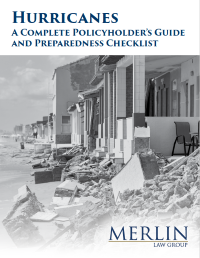
Hurricanes: A Complete Policyholder’s Guide and Preparedness Checklist
Hurricanes: A Complete Policyholder's Guide and Preparedness Checklist details proactive steps you can take before, during, and after a hurricane to ensure your property is protected. Even if not currently facing a hurricane threat or dealing with a hurricane damage insurance claim, it is always good to be prepared.
Download eBook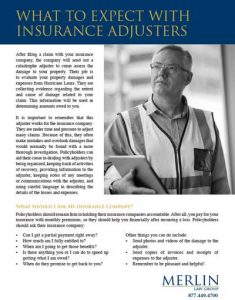
What To Expect With Insurance Adjusters
It is important to remember that the adjuster works for the insurance company. They are under time and pressure to adjust many claims. Because of this, they often make mistakes and overlook damages that would normally be found with a more thorough investigation.
Download eBook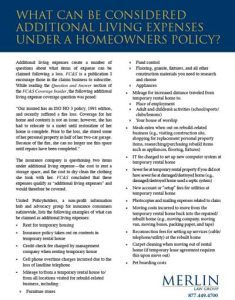
What Can Be Considered Additional Living Expenses Under a Homeowners Insurance Policy?
Additional living expenses create a number of questions about what items of expanse can be claimed following a loss. FC&S is a publication I encourage those in the claims business to subscribe.
Download eBook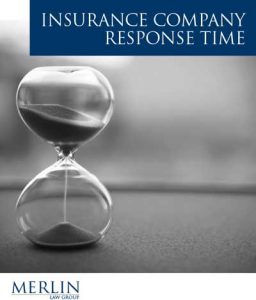
Insurance Company Response Time
When your home or business suffers damage due to a natural disaster, your life can change quickly. Insurance companies are there to help you through this peril, but the wait between the disaster and getting back to normal can be agonizing.
Download eBook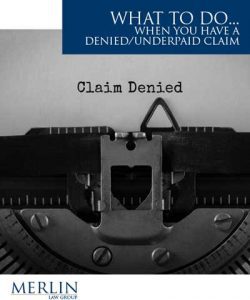
What to Do When You Have a Denied/Underpaid Claim
Having your property insurance claim denied is not the end of the road. Unfortunately, it is the last thing you want to hear after a disaster leaves your home or business damaged, but it is merely another step in the process towards recovery.
Download eBook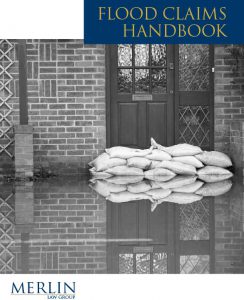
Flood Claims Handbook
Flood insurance is a necessary component of complete hurricane protection. Our Flood Claims Handbook discusses this type of insurance and has helpful information.
Download eBook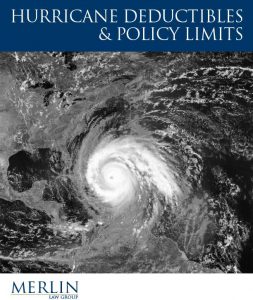
More Information on Hurricane Deductible and Policy Limits
Understanding what is and isn’t covered in your insurance policy is vital to securing adequate recovery after a hurricane loss. We have developed an eBook discussing both policy limits and hurricane deductibles.
Download eBook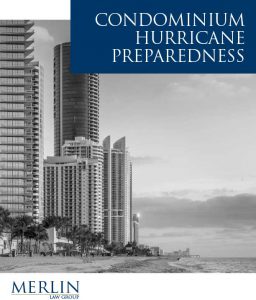
Condominium Hurricane Preparedness
Condominium and other multi-family properties are especially vulnerable to hurricane damage based on the proximity to the shoreline. We represent both individual homeowners and large condominium properties and associations. Our Condominium Hurricane Checklist outlines steps for Community Association Managers.
Download eBook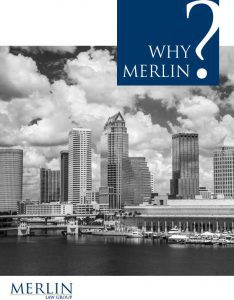
Why Merlin?
Since 1985, Merlin Law Group has aided policyholders achieve recovery with their property insurance claims. We have created an eBook detailing what Merlin can bring to the table in terms of legal representation. Don’t let insurance companies lead you to a second disaster — allow Merlin Law Group to help!
Download eBook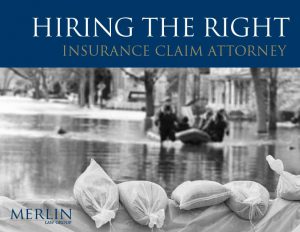
Hiring The Right Insurance Attorney
It is important you find an attorney that will be aggressive in obtaining justice for you. Merlin Law Group’s attorneys have the experience and skillset required to help policyholders receive their entitled coverage benefits. Check out our eBook on what to look for in a property insurance attorney to see if we would be a good fit for you.
Download eBook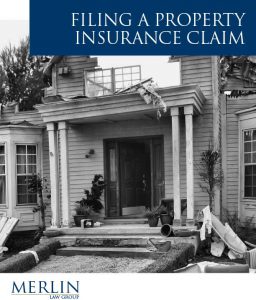
Filing A Property Insurance Claim
Filing a property insurance claim can be confusing if you have never had to do it before. We created this helpful asset outlining the process.
Download eBook